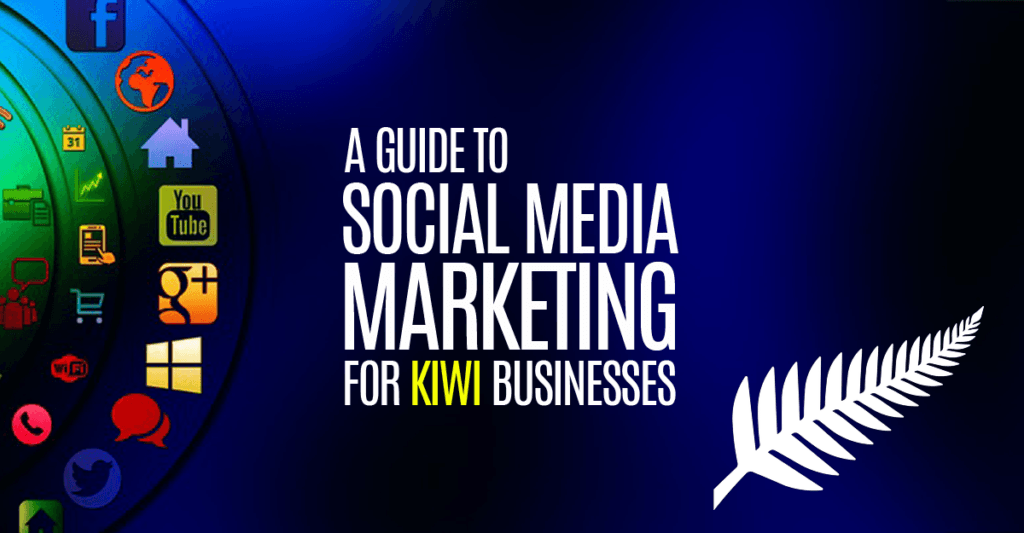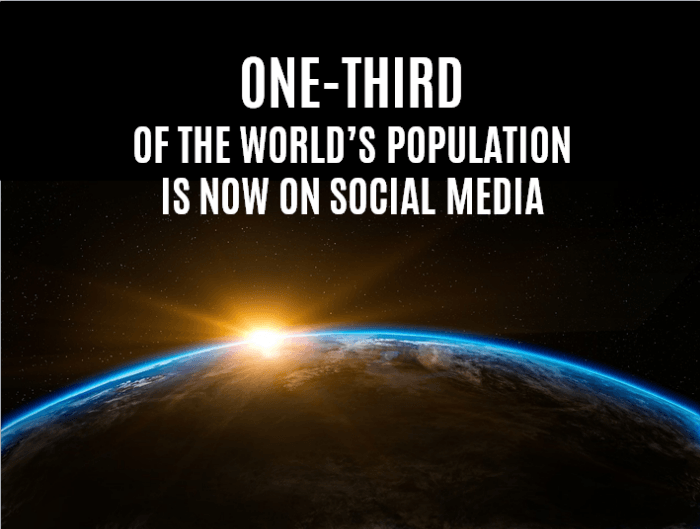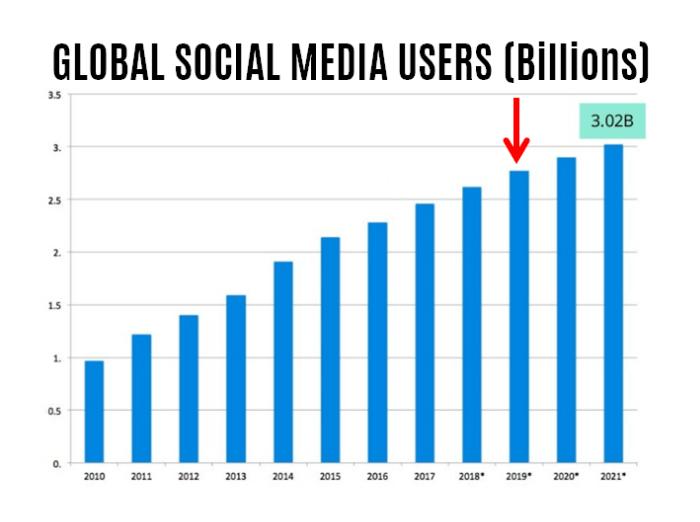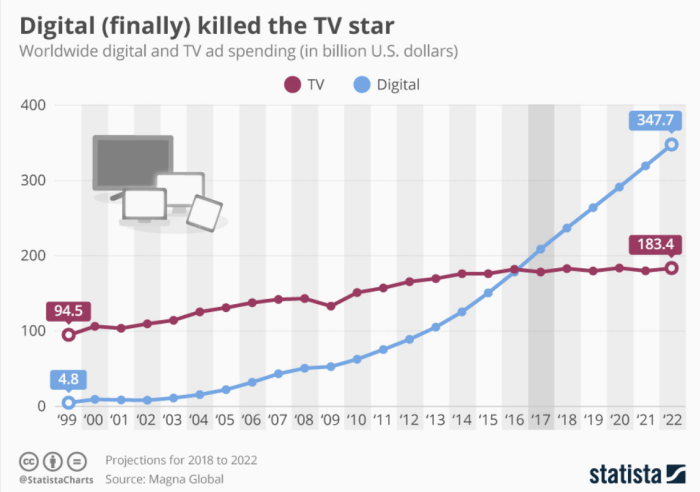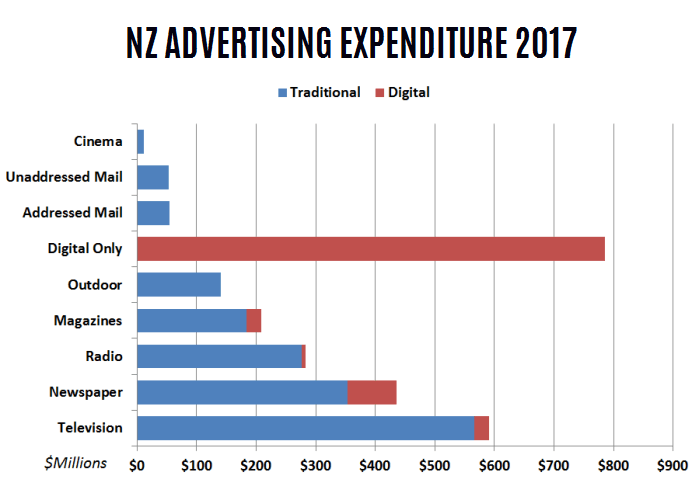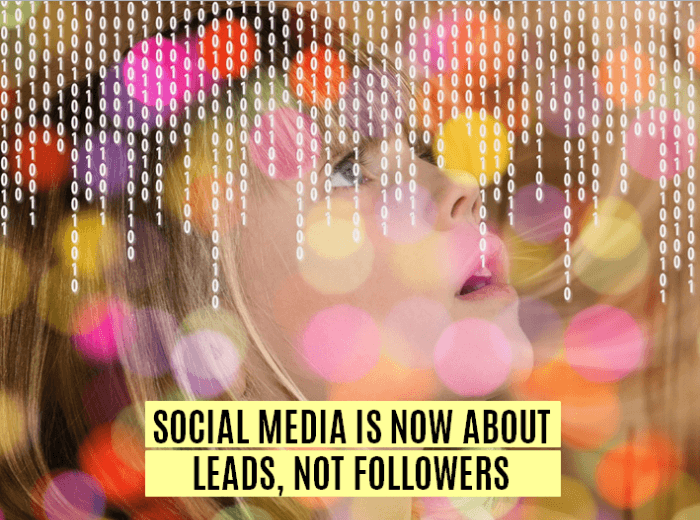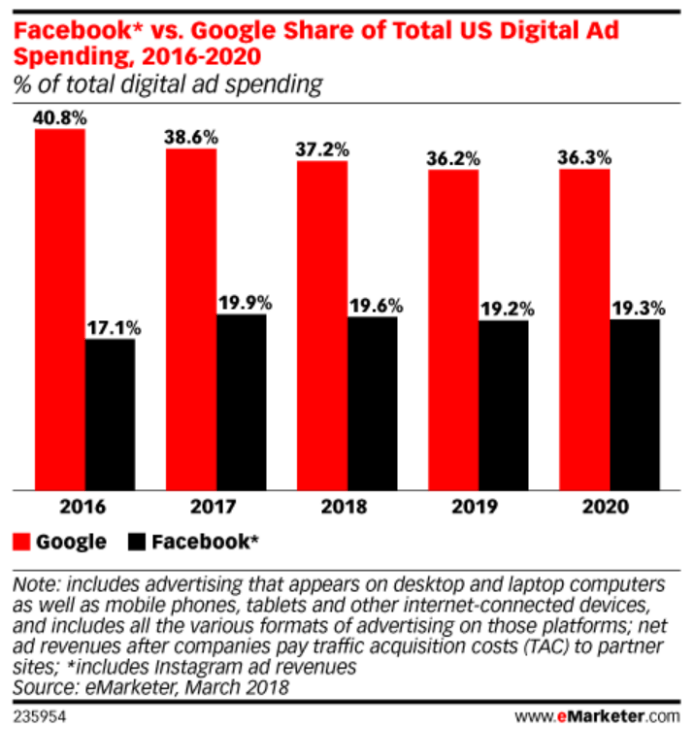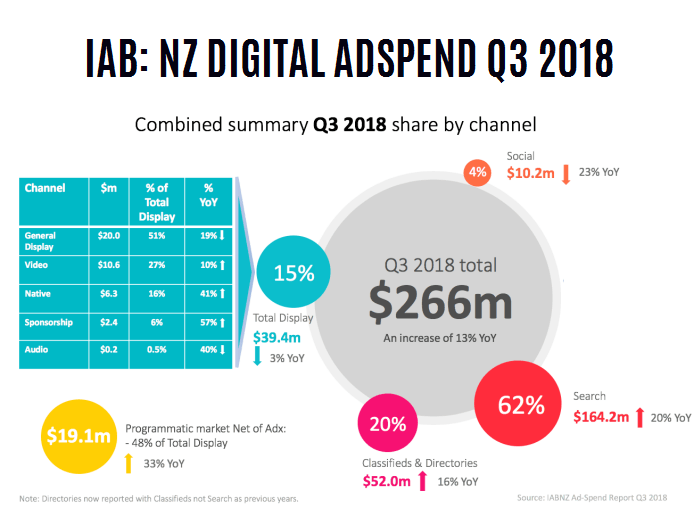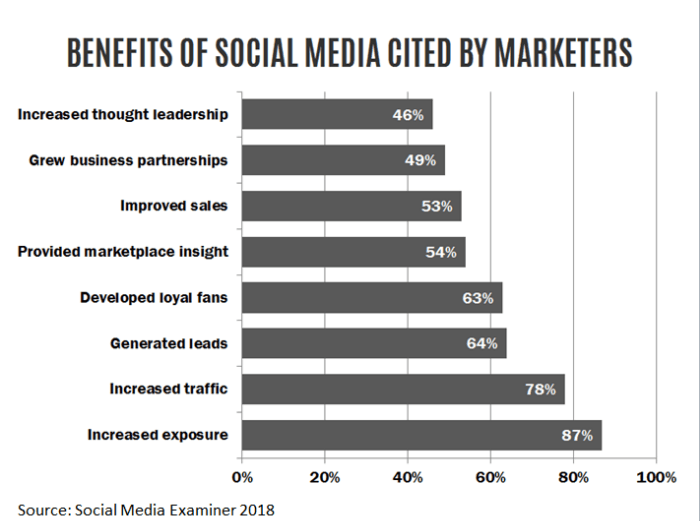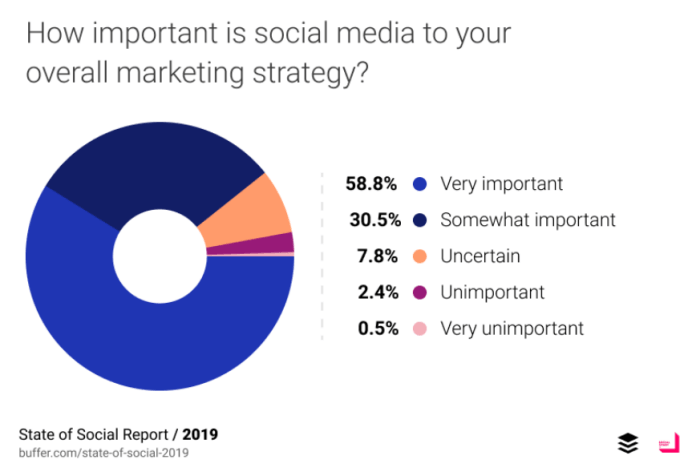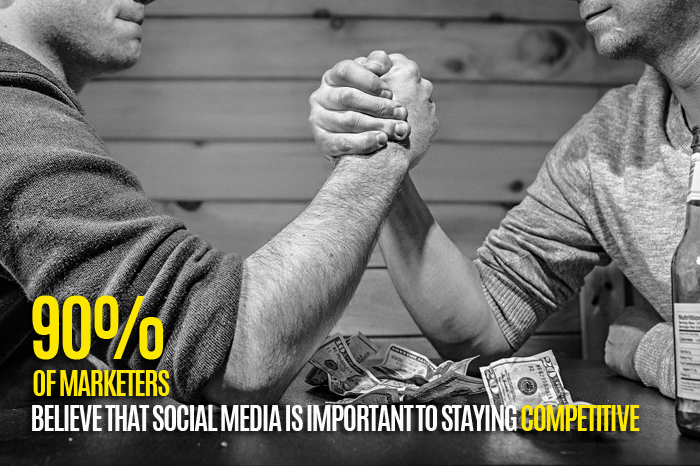These days Social Media matters more than ever for businesses around the world (despite the occasional negative press about things like President Trump, alleged Russian election tampering and reported data misuse by companies such as Cambridge Analytica).
And that’s true in New Zealand as well.
Here’s why:
1. These days, Social Media is where the people gather
Globally, a third of the world’s population has gone social.
If you prefer specific body-counts, here’s the latest estimate, around 2.75 billion:
And yes, New Zealand is right up there in terms of Social Media usage, according to Nielsen Online (December 2018), with 3.8 million regular monthly users, 88% of the population (2+).

And they’re not just occasional visitors, either. The biannual World Internet Project NZ data reveals that two-thirds of us (in this instance, “us” means Kiwi Internet users) visit Social Media networks at least daily.
And yeah, we’ve been known to spend quite a little bit of time pottering on Facebook et al.

In other words, where once the best place for marketers to find Kiwis in large numbers was watching TV, listening to radio or reading newspapers or magazines, nowadays online in general (and Social Media in particular) is where we mostly choose to spend our time.
And yes, where the audience is, the advertising dollars have followed, globally …
… and in NZ, according to industry turnover figures compiled by the NZ Advertising Standards Authority:
2. Social Media is where you can go to join the conversation
In the introduction to his 1999 book “Permission Marketing“, Seth Godin told us:
Whether it is the TV commercial that breaks into our favourite programme or the telemarketing phone call that disrupts a family meal, traditional advertising is based on the hope of snaring our attention away from whatever we are doing.
Seth Godin calls this Interruption Marketing, and, as companies are discovering, it no longer works.
Interruption Marketing has no place in Social Media, either. It’s called “Social” for a reason — it’s all about conversations. Bring your sales pitch to a friendly chat and you’ll quickly get ignored.
Instead, be ready to listen, engage and build relationships with consumers and you’ll finally start to get somewhere.
3. Social Media is where you can hear what people think, for better or for worse

The impact of social media is stronger than ever. Users have a “voice” and can sit back and watch the comments without ever having to reveal their identity, though this has had some negative consequences, as well. A while back, Twitter had to deal with accusations about not being strict enough with their anti-bullying rules and guidelines. Meanwhile, TripAdvisor has been blamed for allowing restaurants to be rated with false reviews, as anyone has the power to “suggest” and give feedback via word of mouse.
Yet, users of digital devices have the power to influence the popularity of products and services, and access information about whatever they want, whenever they want, from other consumers.
Consumers no longer look to brands as the primary source of information – they read forums, blogs or watch tutorials in order to find a product with the perfect fit.
If you provide a lousy product or service, you’ll hear all about it on Social Media. Here, people have a voice — and they’re not afraid to let their friends (and you) know what they think.

On the other hand, if you build a wonderful product, people will happily talk about that as well.

4. Social Media is where you can find people who may want to come to your website
You can actually sell stuff directly to your followers — but ONLY if you have a real relationship with them and have earned to right to (very occasionally, no more than about 10% of the time) offer them special deals.

Alternatively, you can pay for sponsored posts inviting people to your website (which will work, if your content is interesting and relevant to them).
5. It’s where consumers find out about new products
According to data quoted by Ad Week:

6. Social Media is now about leads
In the early days of social media (like, up until six or seven years ago), businesses used to focus their attention on getting followers for their Facebook pages. It was a badge of honour (and a vanity metric) to be able to boast a following in the tens or hundreds of thousands. It was also a valid synonym for effectiveness, since pre-2012 maybe half of your followers might see one of your posts.
Alas, commercial reality intruded, especially once Facebook became a public company and needed to earn decent money. The network’s organic reach (AKA the number of people who see your posts if you don’t pay to advertise) was wound down and down and down.
Nowadays, only a vanishingly-small percentage (1-2% on average) of your followers will see any of your posts, unless you pay to promote those posts.
Yes, there are certainly exceptions. Take this recent unpaid post, for example:
Not a bad turnout, for a page with just 3960 followers. But such results can only be achieved if you really know what you’re doing in Social Media (and have the right sort of product or service and a generally-enthusiastic fanbase).
Instead, you have to treat Social Media as a tool for generating leads rather than attracting adulation. That, in turn, means you have to dabble in metric measurement and determine what works and what (sob!) doesn’t.
7. Social Media is where a great many online advertising dollars are going (internationally far more so than in NZ, for now)
Currently, around one-fifth of US digital dollars are ending up in Facebook’s coffers:
And we’re not just talking pocket change, either. In the last three months of 2018, Facebook earned US$16.9 Billion in revenues, up 33 percent from the same three months in 2017, and US$6.9 Billion of that was profit, up 61 percent from the previous year. Not a bad result, given the annus horribilis that Facebook suffered in 2018.
In New Zealand, Search still dominates (with 62% of total digital adspend) and Social Media is still the poor cousin in terms of adspend (just 4%). That represents an as-yet untapped opportunity.
8. Social Media is where marketers turn for Exposure, Traffic and Leads
Those are the most significant benefits of Social Media, according to marketers.
(To be honest, those are the sorts of benefits we would aim to achieve with ANY advertising, so these aren’t exactly staggering research results).
9. It’s become an essential component in marketing strategies
Social Media now plays a significant role in most marketing strategies, according to the 2019 Buffer State of Social report.
Again, not exactly surprising for a medium attracting around 20% of US digital advertising dollars. What this data really suggests, however, is that New Zealand marketers should devote (a lot) more attention to social media advertising than they currently do.
Keep Up-to-Date
Social Media is constantly changing, and unless you’re working with the medium every day, you can quickly fall behind on the latest tools, techniques and developments.
And that’s a problem because, according to Hootsuite’s recent Social Media Barometer Report (which surveyed 9000 marketers across 19 countries, including New Zealand), 90% of respondents think social media is important for staying competitive.
The Social Media Barometer Report also shows that social media will continue to be a critical platform for businesses and customers. Almost three quarters of respondents agree that social media will increasingly contribute to their company’s bottom line.
So how can you learn more about Social Media Marketing?
To help meet the needs of Kiwi businesses, we offer a number of social media marketing courses.
These are some of our most popular courses (click through for more information):
The Principles & Practice of Social Media Marketing
This is a thirteen-part online training course providing a comprehensive introduction to Social Media Marketing, from the Basics to detailed instructions on how to build and run a Social Media Marketing programme.
For more details of the Social Media Marketing online course, please click here
So you have a few hundred (or a few thousand) followers on Facebook but now you want to know how to get to the next level? Our Facebook Accelerator seven-part online training course will lead you through the steps necessary to supercharge your Facebook presence and get Kiwi consumers engaging with you and your brands.
For more details of the Facebook Accelerator programme, please click here.
For those who wish to master Facebook Marketing in its entirety, we’ve created a ten-week online training programme which will take you from absolute beginner on Facebook to highly effective Facebook communicator.
For more details of the Complete Facebook Marketing programme, please click here.
Mastering Facebook Advertising
This is a nine-part online training course providing a comprehensive introduction to paid Facebook Advertising.
For more details of the Mastering Facebook Ads online training course, please click here.
Instagram Marketing course

If your target audience is Under 35, Instagram absolutely must be one of your marketing options. This course will give you a solid introduction to this fast-growing social medium.
How to Prepare an Effective Social Media Brief

Even if you don’t intend to become directly involved in social media yourself, you may still need to understand the principles, practices and opportunities of social media — for example, if you need to brief someone about running a social media campaign. This online training course is designed to provide you with the insights necessary to prepare an effective brief.
For more details of the How to Prepare an Effective Social Media Brief programme, please click here.
How to Use LinkedIn Effectively – For Your Business And Your Career

This is a seven-part online training course providing a comprehensive introduction to LinkedIn, from the basics to detailed instructions on how to use LinkedIn to promote your organisation, build your personal reputation, find a job, recruit prospective employees and even make sales.
For more details of the How to Use LinkedIn Effectively programme, please click here.
